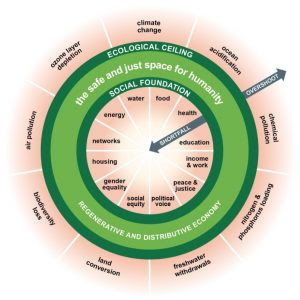Page added on June 17, 2017
Doughnut Economics:a step forward, but not far enough

Doughnut Economics, by Kate Raworth (Chelsea Green, 2017) is an interesting book that goes in the right direction in the sense of promoting a circular economy, but it leaves you with the impression that it missed that extra step that would have lead it to define the goal in the right way. Bridging the gap between standard economics and biophysical economics is still far away.
So, what is this “Doughnut” that gives the title to the book? Initially, I had imagined that it was supposed to be a sort of mandala representing the concept of circular economy. But that doesn’t seem to be the case: circular mandalas often represent the cyclical movement of a wheel, but the doughnut doesn’t (as, indeed, most doughnuts are not supposed to be used as wheels). Here is how it is represented in the book:
It is described in the book as “a radically new compass for guiding humanity this century.” Ambitious, to say the least, but how is that supposed to work, exactly? Maybe I am missing something, but I not sure I can understand why the numerous concepts appearing in the figure should be arranged in a “doughnut.”
The problem with the doughnut is not so much to understanding why it is shaped like a doughnut, but what it lacks. Look at the outer ring; you will see 10 sectors, all related to pollution: climate change, ocean acidification, chemical pollution, etc. Something is conspicuously missing and it is not a minor element of the overall picture. It is natural resources. And note also how the related concept of “waste” is missing as well – the term never even appears in the text of the book. (*)
Natural resources, their depletion, and the related concept of “overshoot” are not just missing from the doughnut, they go mostly unmentioned and unnoticed in the whole book. To give you an example, Raworth mentions the study “The Limits to Growth” only once in the book and in a discussion of less than two pages, Her position seems to be summarized by the following statements:
Mainstream economists were quick to deride the model’s design on the basis that it underplayed the balancing feedback of the price mechanism in markets. If non renewable resources became scarce, they argued, prices would rise, triggering greater efficiency in their use, the wider use of substitutes, and exploration for new sources. But in dismissing World 3 and its implied limits to growth , they too quickly dismissed the role and the effect of what the 1970s model simply called pollution … World3’s modeling of pollution turned out to be prescient…. recent data … find that the global economy seems to be closely tracking its business-as-usual scenario.
As it is often the case, Raworth’s statements have to be interpreted because they are always nuanced; if not vague, as when she says one should be “agnostic” about economic growth. Here, the interpretation seems to be that The Limits to Growth may have been right, but only because it took into account pollution, while its treatment of natural resources was wrong because depletion can be completely neutralized by market factors. It is not mentioned how market factors could deal with industrial and urban waste, but apparently they would be able to make it disappear, too.
Raworth doesn’t seem to realize that she is contradicting herself, here: if the “business as usual” scenario produced good results in terms of comparison with the real world’s economy, it is because it contained depletion as a major constraint. World 3 could also be run in the hypothesis of infinite natural resources, with pollution the only constraint, but the results would not be the same.
That’s the thread of the whole book: natural resources are not a problem; we should instead be worried only about pollution. The circular economy is a good thing only in relation to abating pollution, with the corollary that it also brings about also better social equality. This is not wrong; it is true that a cyclical “regenerative” economy would be able, in principle, to reduce or eliminate pollution. Still, it is curious how the question of mineral resources is so conspicuously missed in the book. And without the concept of depletion, many things that are going on today in the world cannot be really understood.
Kate Raworth is described in the book flap as a “renegade economist”, but she still reasons like an economist. The idea that the price mechanism will make depletion always irrelevant is old and it goes back to the 1930s, when the so called “functional model” was presented, stating exactly what Raworth describes: market factors will always re-adjust the system and magically make depletion disappear. This idea is by now entrenched in the standard economic thought and it seems all but impossible to have most economists abandon it.
The interesting point is that not only economists tend to dismiss depletion as irrelevant. In recent times, the whole “environmental movement” or the “Greens” have taken exactly the same position. All the debate about climate change is normally based on the supposition that minerals, and in particular fossil fuels, will remain cheap and abundant for the current century. If this is the case, it makes sense to propose to spend untold amounts of money for carbon capture and sequestration (CCS) rather than for renewable energy. It goes without saying that, if this assumption turned out to be wrong, the whole exercise of CCS, if it were undertaken at the necessary scale, would turn out to be the greatest resource misplacement of resources in human history, possibly even worse than nuclear energy.
Why is that? As a puzzle, it is difficult to solve. In principle, resource depletion and its negative effects would seem to be easier to understand than the complex chain of factors that leads from the emission of greenhouse gases to disastrous events such as sea level rise, heat waves, hurricanes, and the like. Maybe it is just a question of the lifetime of memes. The meme of depletion started before that of climate change and it is now in its downward trend. Whatever the case, we seem to be locked in a view of the world that misses some fundamental elements of the situation. Where this special form of blindness will lead us is all to be seen.
Getting back to Raworth’s book, despite the criticism above, I can also say that it is worth reading for its broad approach and the wealth of concepts it contains. Its discussion on how the science of economics came to be what it is nowadays is, alone, worth the price of the book. Although it misses part of the problem, it may open up new views for you.
Cassandra’s legacy by Ugo Bardi
7 Comments on "Doughnut Economics:a step forward, but not far enough"



MASTERMIND on Sat, 17th Jun 2017 9:13 am
Collapse of Global Civilization by 2020-Irrefutable Evidence
https://www.reddit.com/r/collapse/comments/6g2d7j/collapse_of_global_civilization_by/
Dredd on Sat, 17th Jun 2017 10:05 am
DOH nut …
Really, is this post about prostitution?
onlooker on Sat, 17th Jun 2017 10:59 am
Good ideas that we should have implemented 30 or so years ago. Now too little too late
Apneaman on Sat, 17th Jun 2017 10:56 pm
hUMANS
“How do you cause people to believe in an imagined order such as Christianity, democracy or capitalism? First, you never admit that the order is imagined.”
― Yuval Noah Harari, Sapiens: A Brief History of Humankind
Davy on Sun, 18th Jun 2017 5:51 am
We are just now getting to the point where our knowledge and science is telling us what the right way is. This of course is lost in the noise of so many ideas of the way that are wrong. The things that are wrong are unfortunately the dominant narrative. Affluence through liberal democracy supported by a global system of competitive cooperation manifested in market based economics is a failure. Within this exoskeleton of a techno man is a variety of themes that are diverse but most are failures because they are homocentric not nature centric. This happened because man came to see himself as exceptional when he civilized. When he had time to sit and pounder life is when he took a wrong turn.
The status quo is not balanced nor in scale to our planetary system. Nevertheless thinking within the status quo has achieved a human enlightenment. We now know things that are profound. This does not mean much though because the case of the more you know the less you know is always going to be present. My point is we have come to understand the basics of our planet and our species. This is great but unfortunately we took it over the cliff to get there. Our development to get to the point of this knowing took us beyond the point of self-preservation. It took our techno development to amass the scientific and accumulation of knowledge we have today to know our basic essence.
The chief element to this understanding is understanding were we went wrong. We now know that this techno development itself was wrong. We now know we should not have opened the atomic genie. We should not have gone into DNA. We should not have allowed populations to go to levels they are. We should not have industrialized. It took getting to this place that is the wrong place to know we are in the wrong place.
Maybe this is the self-destruct mechanism that is built into the nature of nature itself. Knowledge is just another aspect of the universe that has a place and beyond that place it is a force of destruction and bellow that place it is a force of growth. In our case we passed the threshold. We may continue on and even develop more spectacularly but every indication is humans are dated and we are nearing our shelf life.
We may achieve an energy transition and manage to substitute with efficiency a new civilization. That is still a fantasy but one that may happen. The key here is that even if we achieve that transition we are still not going to achieve the immortality we crave as a species. We have gone through a door we can’t go back through with climate. We have polluted and destroyed the web of life. That will not return in human time frames. We have systematically taken our civilization to a breaking point with populations and consumptions out of scale and without balance to natural cycles. This cannot be remedied without a collapse and rebirth.
A rebirth may not be possible because of the damage we have done. So what we have gained is wisdom from an existentially profound mistake. We now know how we should not have lived as we did and that is how we are currently living. Maybe those who survive the worm home of the destructive process this knowledge has created can manage to take that highest of human discoveries with them into a brave new world ahead of the postmodern human. What an amazing thing to kill yourself by learning.
makati1 on Mon, 19th Jun 2017 6:47 am
A related documentary: “AMERICA — From Freedom To Fascism”. Do you pay income taxes?
https://www.youtube.com/watch?v=kE8RtL3azDg
I don’t.
Davy on Mon, 19th Jun 2017 8:59 am
Makati, if you don’t file a return they will garnish you social security stipend. You should be smarter than that.